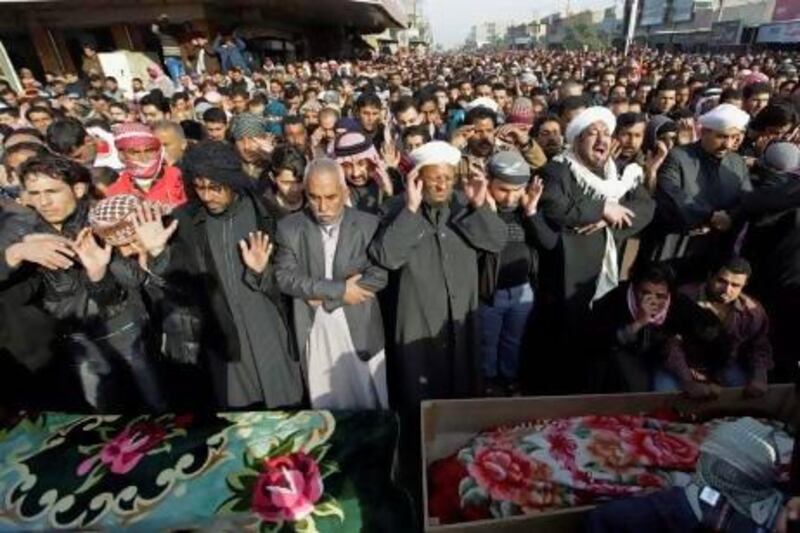FALLUJAH, IRAQ // Two Iraqi soldiers were killed and three others were abducted in Fallujah today as hundreds of mourners gathered in the city for the funeral of protesters killed during a shooting by army troops a day earlier, according to officials.
The attacks and kidnappings appeared to be in retaliation for the deaths of protesters in clashes on Friday, and are likely to further strain tensions between Iraq's minority Sunnis and the Shiite-led central government.
Also today, Iraqi lawmakers said parliament has approved a law that would limit the terms of the prime minister, president and parliament speaker to a maximum of two terms. The measure, which must still be approved by Iraq's president, could pose a challenge to prime minister Nouri Al Maliki's plans to seek the post again in 2014.
The Fallujah policeman Major Rasheed Al Adeeli said one of the soldiers killed was hit by a sniper on the outskirts of the city. Another was shot dead when gunmen attacked a military post where soldiers were packing up their equipment on the northern edge of the city.
Gunmen ambushed the car of three off-duty soldiers on the outskirts of Fallujah and kidnapped them, according to state television and a provincial police official. The official said authorities have launched a manhunt for the missing men.
Mourners hoisted caskets and waved Iraqi flags while shouting, "Allahu Akbar." The funeral procession took place in central Fallujah, not far away from the city's cemetery.
Iraqi soldiers opened fire on Friday on stone-throwing demonstrators near Fallujah, killing at least five, according to local authorities. Two other soldiers were killed on Friday in apparent payback for the protesters' deaths.
Sunnis angry over perceived second-class treatment and what they see as unfair policies targeting their sect began demonstrating last month in Anbar. The protests have since spread to other predominantly Sunni areas.
The protesters are demanding the release of detainees and the cancellation of a tough counterterrorism law and other policies they believe overwhelmingly target Sunnis. Many link their cause with the broader Arab Spring and are calling for the downfall of the government altogether.
Iraqi state television aired a statement from the defence ministry on Friday saying it would investigate what happened in Fallujah.
The United Nations envoy to Iraq, Martin Kobler, said the UN is increasingly concerned about the rising level of tension within the country.
"We urge the government to exert self-restraint in law and order, and respect human rights," he said. "Our message to the demonstrators is to exercise their right to demonstrate peacefully."
Mr Kobler also called on political leaders across Iraq to "sit together in a constructive dialogue".
Muhammed Al Khalidi, a Sunni MP, said that 170 MPs voted in favour of the law limiting the terms on the prime minister and other top officials. He said members of Mr Al Maliki's State of Law bloc boycotted the session.
Mushriq Naji, a lawmaker from the bloc headed by the cleric Muqtada Al Sadr, confirmed the vote. He said the measure is needed "to prevent the return of the dictatorship to Iraq".
"This law ensures that no person can stay in power for an unlimited time and that democracy will continue in this country," Mr Naji said.
Putting the law into force could prove challenging, however.
Iraq's president must sign off on the legislation. The current president, Jalal Talabani, is incapacitated following a stroke and is being treated in a German hospital, and it is unlikely he would be able to sign the law into force.
The legal expert Tariq Harb downplayed the significance of the vote. Even if it were to be enacted, the supreme court could rule that it contradicts the constitution and is therefore invalid, he said.
"This vote could be part of a political game because the Iraqi constitution does not limit the terms for the prime minister and the parliament speaker," he said. "Also, the same parliament could convene at any time in the future and decide to abolish the new law if the political map changes."





